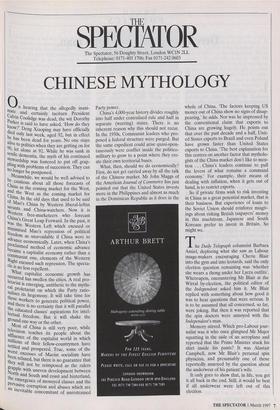SPECT mE AT OR The Spectator, 56 Doughty Street, London WC1N 2LL
Telephone: 0171-405 1706; Fax 0171-242 0603
CHINESE MYTHOLOGY
On hearing that the allegedly inani- mate and certainly taciturn President Calvin Coolidge was dead, the wit Dorothy Parker is said to have asked, 'How do they mow?' Deng Xiaoping may have officially died only last week, aged 92, but in effect he has been dead for years. No one stays alive to politics when they are getting on for 90, let alone at 92. While he was sunk in senile dementia, the myth of his continued stewardship was fostered to put off grap- pling with problems of succession. They can no longer be postponed. Meanwhile, we would be well advised to be . cautious about all those forecasts of China as the coming market for the West, and the West as the coming market for China. In the old days that used to be said of Mao's China by Western liberal-leftist savants and China-watchers. Now it is Western free-marketeers who forecast China's Great Leap Forward. In the past, it Was the Western Left which excused or rmnimised Mao's repression of political freedom as unavoidable if China were to advance economically. Later, when China's proclaimed method of economic advance became a capitalist economy rather than a communist one, elements of the Western Right excused such repression. The specta- cle is no less repellent. What capitalist economic growth has occurredhas swollen the cities. A real pro- letariat is emerging, antithetic to the mythi- cal. proletariat on which the Party ratio- nalises its hegemony. It will take time for these workers to generate political power, and there is no certainty that it will parallel the educated classes' aspirations for intel- lectual freedom. But it will shake the ground one way or the other. Most of China is still very poor, while television teaches its people about the affluence of the capitalist world in which millions of their fellow-countrymen have settled and prospered. True, some of the worst excesses of Maoist socialism have been relaxed, but there is no guarantee that they will not be reimposed as the rulers North with uneven development between iNorth and South and coast and hinterland, the emergence of moneyed classes and the pervasive corruption and abuses which are inevitable nevitable concomitant of unrestrained Party power. China's 4,000-year history divides roughly into half under centralised rule and half in separate (warring) states. There is no inherent reason why this should not recur. In the 1950s, Communist leaders who pro- posed a federal structure were purged. But the same expedient could arise quasi-spon- taneously were conflict inside the politico- military to grow to a point where they cre- ate their own territorial bases.
What, then, should we do economically? First, do not get carried away by all the talk of the Chinese market. Mr John Maggs of the American Journal of Commerce has just pointed out that the United States invests more in the Philippines and almost as much in the Dominican Republic as it does in the whole of China. 'The factors keeping US money out of China show no signs of disap- pearing,' he adds. Nor was he impressed by the conventional claim that exports to China are growing hugely. He points out that over the past decade and a half, Unit- ed States exports to Brazil and even Poland have grown faster than United States exports to China. 'The best explanation for this centres on another factor that mytholo- gists of the China market don't like to men- tion . . . China's leaders continue to pull the levers of what remains a command economy.' For example, their means of dealing with inflation, when it gets out of hand, is to restrict exports. So if private firms wish to risk investing in China as a great potential market, that is their business. But experience of loans to the Soviet Union should reinforce misgiv- ings about risking British taxpayers' money in this maelstrom. Japanese and South Koreans prefer to invest in Britain. So might we.
The Daily Telegraph columnist Barbara Amiel, deploring what she saw as Labour image-makers encouraging Cherie Blair into the gym and into leotards, said the only election question remaining was 'whether she wears a thong under her Lycra outfits'. Whereupon, encountering Mr Blair at the Wirral by-election, the political editor of the Independent asked him it. Mr Blair replied with something about how good it was to hear questions that were serious. It is to be assumed that all concerned, so far, were joking. But then it was reported that the spin doctors were annoyed with the Independent's man.
Memory stirred. Which pro-Labour jour- nalist was it who once glimpsed Mr Major squatting in the aisle of an aeroplane and reported that the Prime Minister stuck his shirt inside his pants? It was Alastair Campbell, now Mr Blair's personal spin physician, and presumably one of those reportedly annoyed by the question about the underwear of his patient's wife.
It only goes to show that, in life, you get it all back in the end. Still, it would be best if all underwear were left out of this election.


























































 Previous page
Previous page